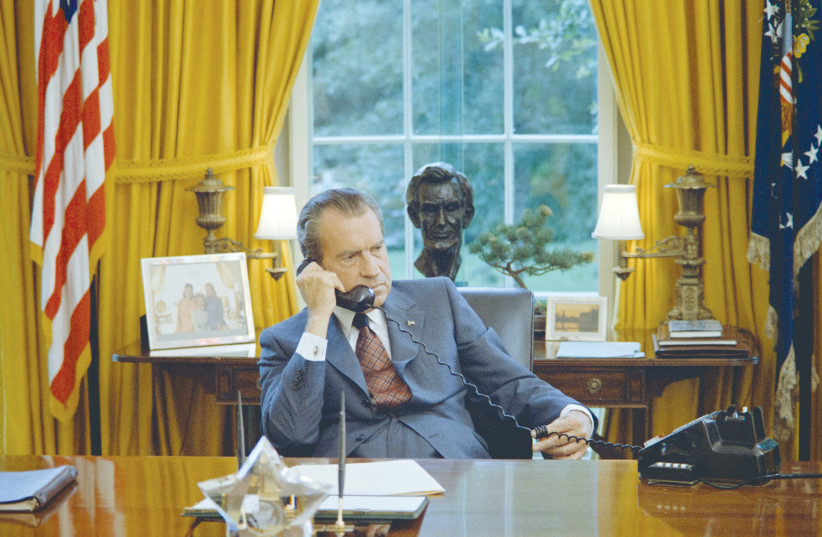More than four decades later, and in a small country oceans away, that same reasoning echoed loudly in the letter the four rabbis sent Rivlin this week.

Israel can be likened these days to a country split in two, where one half of the country is watching one film in one movie theater, and the other half watching a different film in another.
That is how Rabbi Amichai Gordin, of Yeshivat Har Etzion in Alon Shvut, summed up the country’s present situation in an interview on Army Radio Thursday morning. In one cinema, the movie being screened is of a corrupt prime minister; while in the other, the state attorney’s office and police are corrupt.
“What we are asking is to turn out the lights and bring the people out of both theaters,” he said. And the way to do that, he maintained, is to have President Reuven Rivlin grant Prime Minister Benjamin Netanyahu a pardon, in return for Netanyahu leaving public office.
Gordin was one of four national-religious rabbis who wrote a letter in this spirit to Rivlin earlier this week.
The other signatories were: Yaakov Medan, one of the heads of the Har Etzion yeshiva; Amitai Porat, the secretary-general of the Religious Kibbutz Movement; and Haim Navon, who teaches Jewish thought and Talmud at various institutions and is a popular weekly columnist for Makor Rishon.
“The political system in Israel is in the middle of an unprecedented and dangerous political and legal crisis,” the letter read. “This crisis threatens the ability of the political system to provide answers to the difficult challenges facing Israel today.”
The letter “urged” Rivlin to grant a pardon to Netanyahu in return for his leaving office. “This step, which does not determine guilt or innocence, seems to us the only exit to the situation we are in,” the rabbis wrote.
Gordin explained in the radio interview that the country’s “basic fabric” has become frayed over the last year, and “we are losing the confidence of the public both in the political system, and also in the legal system.”
And the bad news, he added, “is that it is only going to get worse.”
The appeal to Rivlin for a presidential pardon, therefore, is simply a way of putting an end to the entire saga, and enabling the country to move its focus on to other, more pressing, issues – from passing a budget to confronting Iran.
Rivlin, as the country’s president, has the power to pardon or commute sentences, and in the run up to the country’s 70th anniversary two years ago he used this power to pardon or commute the sentences of dozens of criminals.
None of those cases, however, came anywhere near the magnitude of the Netanyahu case.
Which does not mean there have not been high profile pardons in the past. There have been, with the most significant being President Chaim Herzog’s 1986 pardon of Shin Bet head Avraham Shalom, four of his top deputies, and seven other Shin Bet agents involved in the killing of two Palestinian terrorists in the Bus 300 Affair, and in the ensuing cover-up that falsely implicated then brigadier-general – and future defense minister – Yitzhak Mordechai.
Those pardons, before the cases were brought to trial, were justified on the ground that the public scrutiny that the Shin Bet would come under during a trial would damage its efficiency and harm the country’s security. In other words, the country could simply not afford a trial.
Herzog defended his decision, highly controversial at the time, by saying that “it would be recognized in the future as the right decision – just as everyone in the United States now recognizes the rightness of President Ford’s decision to pardon President Nixon.” He was referring to former US president Gerald Ford’s pardon of Richard Nixon in 1974 following the Watergate scandal.
And it is that pardon which seems most similar to the one that the four rabbis are now asking of Rivlin for Netanyahu.
In September 1974, Ford – in a decision that defined his presidency and, some argue, doomed his reelection chances in 1976 – granted a pardon to Nixon, who had resigned a few weeks earlier. Ford argued that this was necessary if the country was to get beyond Watergate and begin to heal the wounds the scandal had opened.
Though contentious at the time, most historians, according to a New York Times article last year, “now agree that Ford did the right thing for the country, which was reeling from the continuing war in Vietnam, economic stagnation, an energy crisis and the political turmoil left over from Watergate.”
Watergate had split America into warring camps, and Ford hoped that his action would allow the country to put the Nixon saga behind it and move on.
According to the Times, even former senator Edward Kennedy, who opposed the pardon when Ford made the decision, softened as time passed. In an event in 2001 honoring Ford, Kennedy said that “time has a way of clarifying past events,” and that he had come to see that Ford acted correctly.
“His courage and dedication to our country has made it possible for us to begin the process of healing and put the tragedy of Watergate behind us,” Kennedy said.
Ford, in explaining his reasoning to the American people, said it would be many months and years before Nixon’s case would go through the courts.
“During this long period of delay and potential litigation, ugly passions would again be aroused. And our people would again be polarized in their opinions,” he said. “And the credibility of our free institutions of government would again be challenged at home and abroad.”
More than four decades later, and in a small country oceans away, that same reasoning echoed loudly in the letter the four rabbis sent Rivlin this week.
As reported by The Jerusalem Post
